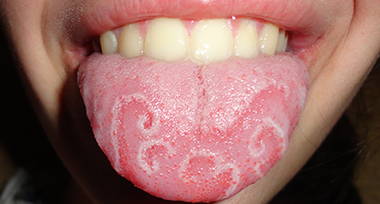What does an itchy tongue mean? Is it an indication of a serious underlying health condition like cancer or diabetes? A tungling in tongue can be a symptom of STD or HIV or simply a simple case of food allergy like fish or fruits. This article will help you understand the meaning of tingling on tongue, the causes and how you can treat at home. We will also explore more on the possible health conditions associated with dry tongue that itches.
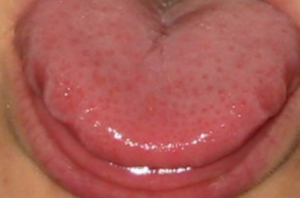
Itchy tongue meaning
What does a tongue that itches mean? Your tongue is able to tell if you are healthy or not by the look of it. In fact most healthcare providers often use the tongue as the preliminary examination to tell the state of health of a person. If you have a tongue, mouth or throat that itch when you eat certain foods, the explanation is simple. You probably suffering from allergic reaction.
If the itching is mild or not associated to any serious health complications such as cancer or HIV, it may suggest that you have oral allergy syndrome. People who have this syndrome tend to react to certain plant-based foods that basically contain proteins similar to those they get reaction to. For instance, if you’re allergic to bitch-tree pollen, this can cause a similar reaction on your tongue if you eat foods such as apple, carrots or almonds.
Itching in the tongue could also be triggered by food allergy. You are likely to have a tongue that itches if you eat food such as fish, shellfish, eggs, milk and nuts. In severe cases, some people will have a feeling of a burning tongue, rash, tingling and in some cases the tongue ends up swelling.
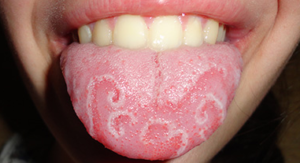
Picture
How does a tongue that itch look like? To help you understand, we have inserted images and photos below. They are meant to provide a vivid understanding of the condition. This can help you identify well with the symptoms. We aim to illustrate more clearly the itching on tongue by adding pictures in the post.
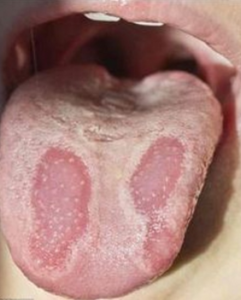
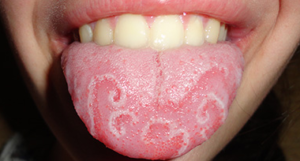
Symptoms
What are the symptoms of an itchy tongue? An itchy tongue is associated with symptoms such as itching and tingling in the mouth and throat. Depending on the cause of itching in the tongue, the symptoms tend to vary. People with seasonal allergies are the most affected most. It is not surprising to see some hay fever sufferers having an itching in their mouth, at the tip of the tongue, throats and sometimes lips.
This condition commonly referred to as oral allergy syndrome (OAS) is associated with food allergy. If you have oral allergy syndrome, the tongue is likely to itch especially when you eat proteins found in fresh fruits like pineapples, apples, mangoes or nuts. The tongue is subject to reaction or burning- like sensation if you eat raw vegetables and spices. Your body immune system tend to recognize a close similarity between the food and pollen’s proteins. This is also referred to as cross reactivity.
Other symptoms of itchy tongue include:
- Red bumps on the tongue that itches. If the cause is severe, the tongue can get fissured and red bumps tend to form. This can be coupled with swelling of the tongue either at the tip or sometimes underneath. It happens as soon as or minutes you put food in the
- Blisters on the tongue. Allergic reaction on the tongue that itches can cause the tongue to bleed and in the long run blood blisters will form. Oral allergy syndrome causes feel of burning or heat on the tongue.
- Ridges on the tongue. Itching in the tongue can cause severe ridges on the tongue such that you end up having a geographic tongue. Food allergy and spices tend to cut the tongue forming ridges on the tongue of the affected person.
- Sore itchy tongue. Soreness in the tongue is one of the symptom closely associated with itching in the tongue. A feeling of a dry tongue is also one of the oral symptoms associated with tongue itching.
- Immediate swelling of the tongue or the mouth. Itching in the tongue related to food allergy cause swelling of the mouth, tongue and the lips. According to Dr. Wayne Shreffler, a director of Food Allergy Center at MassGeneral Hospital for Children in Boston, the swelling is immediate and might be uncomfortable.
Possible Causes:
Why is my tongue itching? The fact that the tongue has small crevices in which food particles, dead skin cells and bacteria harbor pose a risk to your tongue. If you are allergic to certain food, you’re likely to have your tongue itch. The feeling can be as severe leaving your tongue burning and dry. The causes of itchy tongue can range from oral allergy syndrome to more complicated underlying health condition such as cancer, diabetes among other diseases. Let’s see what causes your tongue to itch.
1. Allergic reaction and food allergy
Allergic reaction on your tongue can trigger burning on the tongue. People with seasonal are mostly affected. If you eat uncooked fruits and raw vegetables as well as some nuts or spices, your body immune system tend to recognize a close similarity between the food and pollen’s proteins. Food allergy tend to cause oral allergy syndrome causing your tongue to burn and itch.
It is therefore important to know your worst foods. The most common foods that are likely to trigger allergic reaction on your tongue include; apples, hazelnuts, almonds and carrots. You are prone to suffer from oral allergy syndrome if you include these food in your diet. According to Shreffler, apples are common culprit for the itching feeling on your tongue. If you are allergic to birch pollen as well as foods such as celery or vegetables that are close to birch, you tongue is likely to have a burning sensation.
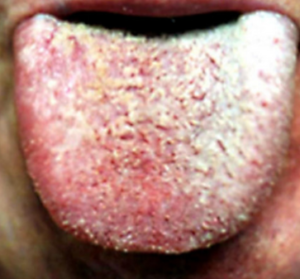
2. Diabetes
We have looked at food allergy as the possible reason of having itching in the tongue. Could there be a possibility of itching or burning on tongue caused by a serious underlying health condition like diabetes? Diabetes is one of the health condition associated with or present its symptoms as a coated or furry tongue and itching or burning tongue.
A sore or painful tongue tend to affect people with oral thrush which can cause a white or yellow coated tongue. If you have a weakened immune system a and or you’re diabetic, you are at risk of getting fungal infection in your mouth. If left untreated, the mouth including tongue and throat gets irritation. It may be uncomfortable to feed properly.
Diabetics who generally have a problem in controlling their blood sugar level will always find themselves prone to yeast and fungi infections. This will have adverse effects if left untreated and one of the possible outcome is oral thrush causing a tingling or burning tongue and throat.
If you are diabetic, you are advised to keep your blood sugar levels under control. This will significantly help to reduce the tendency and severity of yeast infections in the mouth.
3. Itchy yellow creamy tongue a sign of Oral thrush and mouth diseases?
A sore or painful tongue can be caused by yeast infection or other oral problems such as ulcers. Itching on the tongue is a typical case of yeast infection in the mouth and tongue. Oral thrush is an infection in the mouth caused by fungus. If your mouth has been infected by yeast, you’re likely to have a yellow creamy or white coated tongue. This basically can be visible in areas of soreness on the mouth and tongue.
It is surprisingly to get oral thrush if you recently took drugs specifically antibiotics. Oral thrush can cause you to have a bitter or metallic taste on your tongue besides itching. Oral thrush tend to present the following symptoms:
- Bitter or nasty taste, some people would refer it to as metallic taste.
- Bleeding or redness inside the mouth and tongue
- Colored patches in the mouth including the lips, cheeks, tongue or back mouth and throat
- The lips get cracks particularly at the corners
Your tongue can get itchy if you are suffering from a condition known as Aphthous mouth ulcers. You tend to have painful sores that occur anywhere within your mouth and underneath the tongue. Mouth ulcers are brought about by damage to the mouth such as eating hard food, biting your tongue accidentally. If you have ulcers that keep on recurring, you are likely to be stressed, anxious or hormonal changes.
If you have ulcers in the mouth, avoid eating spicy foods. This tend to worsen itching in the tongue and cause more pain. Oral ulcers will heal within a week or two. However, you may reduce the pain and itching by taking over- the- counter painkillers. If healing takes more than two weeks, see your GP or dentist.
4. Heavy smoking of tobacco and alcohol intake
Minor infections or irritations are the most obvious causes of tongue soreness. Minor trauma such as injury caused by accidentally biting the tongue can cause your tongue painful sores. Did you know that heavy smoking can cause a feeling of itchiness on your tongue? Heavy smoking is one among other reason your tongue itches. Smoking makes your tongue to be sore, chemicals from the smoke tend to irritate the tongue.
Smoking and heavy consumption of alcohol are known to cause oral ulcers and more serious cancer of the mouth. Additionally, smoking tend to increase the risk of getting oral thrush. You are likely to get a dry mouth or irritated skin causing skin rash and itching.
5. Itchy tongue a sign of oral cancer?
Is your itchy tongue an indication of oral cancer? Oral cancer is linked to heavy smoking of tobacco and drinking excessive alcohol. Similarly, if you have human papilloma virus (HPV) that can be passed on by oral sex through kissing you may develop cancer of the oropharynx. This include at the back of your throat, mouth, tonsils and base of your tongue.
The use of marijuana is also linked to be the cause of oral cancer. If you started smoking recently you should quit the habit. Itching and bumps under the tongue are the symptoms of onset of oral cancer. Mouth or oral cancer start as white patch that can be visible on the cheek or gums or tongue sore that doesn’t go away.
6. Canker sores
Why is my tongue itching? This could be the question that you keep on asking yourself over and over again. Your tongue could be having open sores that tend to occur under the tongue, on your gums and inside mouth including the cheeks and sometimes at the back of your throat. Canker sores, medically referred to as recurrent aphthous stomatitis (RAS) are opening in your mouth, lips and tongue that develops when the any of these part is broken resulting to painful cut.
Canker sores appear as small whitish or yellowish sores occasionally surrounded by infected circle. You are likely to have canker sores on your tongue if you have a weak immune system, viral infection, lack of vitamins such as B12 or emotional stress. Canker sore in pregnant women is brought as a result of hormonal fluctuations and this can have the effect of a burning or itching tongue. If you are allergic to certain food, you are even at more risk of getting cuts or opening on your tongue.
Treatment of chronic canker sores can help reduce the itchiness on your tongue. You should try the following measures including diet, home remedies and some medications:
- Avoid eating hot or spicy foods
- You may as well use hydrogen peroxide or Orajel to dab the canker sores. This will help to relieve pain temporarily increasing healing
- Rinse your mouth and tongue with salt water to reduce the risk of infection on the cuts
- Apply milk of magnesia to the lesion to speed up healing of the sores
- Supplement your diet with Vitamin B12, iron and folic acid.
7. Itchy tongue HIV, Herpes or STD?
Is your itchy tongue a sign of HIV, oral herpes or sexually transmitted disease? Itchy tongue or sores is not a valid symptom for HIV primary infection. Itching in tongue can be caused by a number of medical conditions. What you need to is to have a test to help ease your mind and remove self-doubt.
However, white spots or unusual blemishes on the tongue, mouth or in the throat can be early symptoms of HIV infections. If you have persistent white spots or bumps or unusual lesion on the tongue or in mouth, you should visit a doctor for having test.
A tingling or itching sensation on the tongue can also be due to oral herpes and candida. Tongue herpes is basically caused by a viral infection called herpes simplex. This infection tend to affect the whole mouth but can also occur on the lips and the tongue.
Herpes or cold sores infection on the tongue can be painful and has a tendency of spreading everywhere in the mouth. To relieve itching or tingling on your tongue, you should start by treating oral herpes or cold sores on your tongue.
Itchy small painful bumps on tongue of a baby
What causes itching on the tongue of a child? Your infant can as well have a white tongue that itches. It could be sores and other oral problems that can be painful and worrisome. If your child is having small painful bumps on the tongue, these could be papillae or simply having inflamed taste buds either due to an injury from burn caused by eating hot food or simply a bite.
You should avoid feeding your child hot, spicy and acidic foods. The inflammation and bumps on the tongue will resolve on its own. You may as well give your child an analgesic such as acetaminophen or ibuprofen to help relieve pain.
Itchy tongue during pregnancy
Are you experiencing an itching on your tongue during your pregnancy? There are number of reasons one can have itchy tongue during pregnancy including oral thrush, allergies among others. However, during pregnancy hormonal fluctuation can be attributed to itching on the tongue and sometimes swollen lips. For instance having yeast infection or thrush during can severely cause a painful itching on tongue and mouth.
Thrush is more common in pregnant women although medics aren’t sure why. But changes in hormones and immune system are believed to be the cause. Similarly if you are diabetic, you’re at greater risk of having oral thrush and other mouth problems.
Treatment
Treatment of a tingly or a burning tongue depends on the underlying cause. For some causes, no treatment is necessary whereas for other condition, medication, surgery or radiation is needed depending on the severity. These are the most common available treatment undertaken for a tingly tongue.
- Anti-allergy medication. If the cause of a burning tongue is caused by allergy to food or medication, your health care provider will prescribe anti-allergy medication.
- Antibacterial medication. Similarly, a tingly tongue as a result of bacterial infection in your mouth, tongue and back of throat can be treated with antibacterial drugs.
- Antifungal medication are prescribe to treat yeast infection such as oral thrush.
- Antiseptic mouth wash can be used to clean your mouth and tongue, this is to reduce inflammation on your tongue.
How to Get Rid of Itchy Tongue with Home Remedies
A burning tongue can be cured at home with some home remedies. This is possible if the underlying cause is not associated with any serious health condition like cancer or diabetes. Here are some of the home remedies you can use to relieve itching in your tongue.
Cold Apple Juice
Itchy tongue can be relieved naturally at home with cold apple juice. A glass of cold apple juice helps to rinse burning in your tongue, soothing irritation on your throat and relieving pain. It has anti-inflammatory properties that helps to reduce inflammation on your tongue and swelling on your tongue and mouth.
Yogurt with Flax seeds
A mixture of ground flax seed and yogurt is another home remedy to help relieve a stinging tongue. Yogurt has Vitamin B5 which helps to produce steroids hormones. Flax seeds on the other hand is rich in omega 3 fatty acids that proves beneficial in alleviating inflammation. The antioxidant properties in flax seeds helps to boost your immune system speeding up healing.
Application of Aloe Vera, raw honey or Lavender oil
Topically apply any of these three; aloe Vera, raw honey or lavender oil on your pricking tongue. They are known to have anti-inflammatory properties which reduces inflammation on your burning tongue. Antifungal properties to help fight infections caused by fungus. Honey is known to have anti-allergy properties to help treat allergic reactions, and relieving pain.
A Burning Tongue Video
SOURCES and REFERENCES
- http://www.livescience.com/46012-oral-allergy-syndrome-avoid-symptoms.html
- http://acaai.org/allergies/types/food-allergies/types-food-allergy/oral-allergy-syndrome
- http://www.diabetes.co.uk/diabetes-complications/diabetes-and-yeast-infections.html
- http://www.nhs.uk/conditions/tongue-pain/Pages/Introduction.aspx
- http://www.dental-health-advice.com/tongue-herpes.html
- http://familydoctor.org/familydoctor/en/health-tools/search-by-symptom/mouth-problems-infants-children.html
